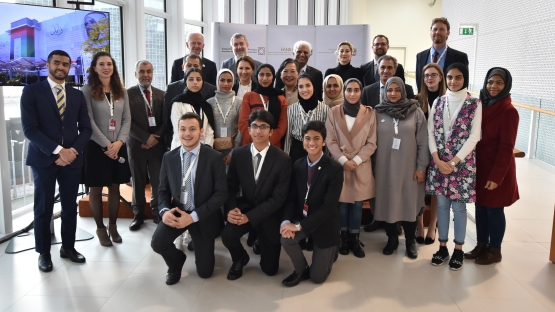Three winning teams from the Jamila Bu Haired School, the Universal American School of Dubai and the Umm Alarab School presented their projects at a side event of the IAEA Ministerial Conference on Nuclear Science and Technology, on 30 November 2018. The teams, winners of a nation-wide competition to inspire high school students in the United Arab Emirates to explore the peaceful applications of nuclear technology, developed a series of projects designed to leverage nuclear science in support of the UAE’s sustainable development, and were invited to attend the Ministerial Conference.
Launched by the Permanent Mission of the UAE to the IAEA, and supported by a regional IAEA technical cooperation project, the national ‘Nuclear Science for Development Student Competition’ encouraged interest in nuclear science by inviting pupils—between the ages of 14 and 18—to submit proposals that would demonstrate how nuclear and isotopic technologies might address challenges in three domains: improvement of health, protection of the environment and water resources, and generation of clean energy.
More than 100 proposals had been submitted to the UAE Ministry of Education. The proposals were reviewed by a team of technical experts from the UAE and the IAEA. Nine teams were shortlisted, who showcased their projects at a special event hosted by Khalifa University in Abu Dhabi on 31 October 2018.
At the Khalifa University event, the ‘Radiation Geeks’ team of the Umm Alarab School was selected for their nuclear transportation engine project, which sought to decarbonize motor vehicles; the ‘Back to the Future’ team of the Universal American School was selected for their ambitious water-resource management project; and the ‘Future Owners’ team of the Jamila Bu Haired School was selected for a project to leverage nuclear science in support of human health. These three winning teams were selected to attend the Ministerial Conference at the IAEA’s Vienna headquarters.
Over the past 10 years, the United Arab Emirates has accelerated its engagement with nuclear science and technology, becoming the first country to start the construction of its first nuclear power plant in 27 years. As a ‘newcomer’ in the field of nuclear power, the country of nearly ten million has launched new initiatives to ensure the sustainability of its nuclear workforce. The national student competition is one of these initiatives.
“The Government places top priority on empowering our young people and building their capability to lead the future,” said Ambassador Hamad Al-Kaabi, UAE Permanent Representative at the IAEA. “We are proud to launch this dynamic initiative, which already has a valuable impact nationwide and will continue empowering the young generations of the UAE and advancing sustainable development.” The side event was also attended by H.E. Mariam Bint Mohammed Saeed Hareb Al Mehairi, Minister of State of the United Arab Emirates.
Following the award ceremony, the winning teams visited the IAEA’s Isotope Hydrology Laboratory in Vienna, and the eight IAEA nuclear applications laboratories in Seibersdorf. The students had the opportunity to learn more about the peaceful and secure application of nuclear technologies, engaged with high-level policy-makers and technical experts, and connected with young professionals from across the globe.
The competition was organized in cooperation with the Ministry of Education, the Federal Authority for Nuclear Regulation (FANR) and Emirates Nuclear Energy Corporation (ENEC), and was supported by an ongoing, regional IAEA technical cooperation project1 designed to expand and sustain nuclear science and technology information, education and communication among secondary school students and teachers in the Asia and the Pacific region.
__________
1 RAS0079 ‘Educating Secondary Students and Science Teachers on Nuclear Science and Technology’






